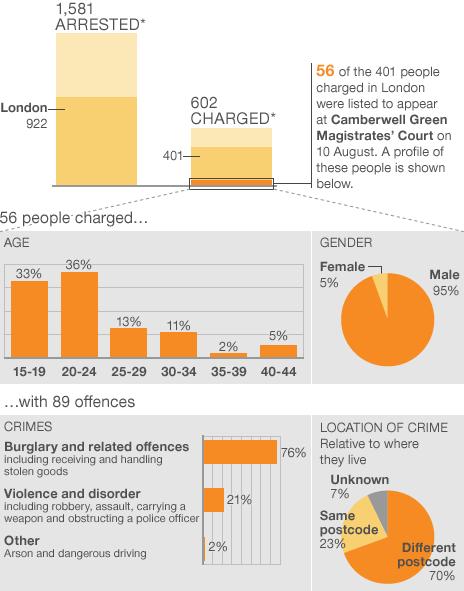It's a Pattern: London Rioters Are Leaving Bookstores Untouched

While the rioters in England this week have looted shops selling shoes, clothes, computers, and plasma televisions, they've curiously bypassed one particular piece of merchandise: books.
The Economist observes that while rioters have a centuries-old history of book burning, "books are losing out to high-end jeans and Apple-made gadgets" in London, with the Waterstone's bookstore chain emerging unscathed and the WH Smith chain reporting only one incident (some stores closed as a precaution). In explaining that the store would probably stay open during the unrest, one Waterstone's employee even felt comfortable enough to issue a dare to the rioters: "If they steal some books, they might actually learn something."
The exception to the rule is the gay bookstore Gay's the Word, which had its front window smashed and its shopfront splattered with eggs (notably, no goods were stolen). "Our impression is that there are certain people who have an issue with a visible gay business and are using the excuse of chaos to cause anti-gay damage," an assistant manager told PinkPaper.
Confronted with all this evidence, The Huffington Post poses a couple vexing questions: "Did the bookstores survive because the rioters respect reading--or because they simply don't care about books? Is this a positive or a negative sign for the future of the industry?" Most people seem to be embracing the theory that the rioters simply didn't want books, particularly in the digital age.
"The only shop NOT looted down the road from where I live was Waterstones," British author Patrick French tweeted. "I guess the rioters have Kindles--bought or looted." Martin Fletcher touched on a similar theme at the end of a report for NBC News. "A final thought that may say a lot about our times," he concluded. "In this shopping center every store had been looted but one, the book store." The "underlying message for bookshops," The Economist adds, is "hardly front-page news: looters, like more conventional consumers, are all too happy to ignore their wares."
Big Green Bookshop co-owner Simon Key, however, suggests the rioters may have been motivated more by economics than pure consumer desire. "The people who were doing this were mainly going for phone shops, high fashion shops and HMV, looking for stuff that they could sell on," he told The Financial Times. "Bookshops weren't top of the list."
Today, as the rioters spill into Britain's courthouses, we're gaining additional insight into who the young, enigmatic looters are and what motivated them to wreak havoc on England's streets, though news outlets are issuing somewhat conflicting reports. The AP, for example, says that the 1,000-plus people who have been arrested--some of whom are as young as eleven--share a deep sense of "alienation."
One 19-year-old looter who did not appear in court explains, "Nobody is doing nothing for us--not the politicians, not the cops, no one." The AP adds that "the rage has appeared to cut across ethnic lines, with poverty as the main common denominator." A BBC infographic today suggests the rioters are primarily young--anywhere from 15 to 24--and male.

But other reports complicate that picture of young men struggling with poverty and social deprivation. The New York Times explains that while many of those who were remanded for trial hailed from an "underclass of alienated young people, with no jobs and few prospects," some of the young men and women came from affluent, middle-class communities and included a graphic designer, a postal employee, a dental assistant, a teaching aide, and a forklift driver.
Sky News adds that one of the rioters who stole $8,000-worth of goods from a Comet store was a student at the University of Exeter and a daughter of a successful businessman. Many of those who appeared in court had no previous convictions, Sky adds. The Guardian, meanwhile, points to one suspect who had 96 previous convictions for theft.
So where does that leave us on the question of why the rioters refrained from looting and burning bookstores? The most likely explanation appears to be that the rioters were more interested in high-end clothing and electronics than books, for economic and personal reasons. But a Guardian article yesterday suggests the rioters may have been more principled about what they stole and what they didn't than one might think. The paper recalls how one person expressed indignation when a fellow looter reached for a hand-stitched wedding dress:
When another group finished ransacking a pawnbroker's and started cleaning out a local fashion boutique, an angry young black woman berated one of them. "You're taking the piss, man. That woman hand-stitches everything, she's built that shop up from nothing. It's like stealing from your mum."
A girl holding a looted wedding dress smiled sheepishly, stuck for anything to say.
Оставить комментарий
Для комментирования необходимо войти через ![]() Вконтакте
Вконтакте
